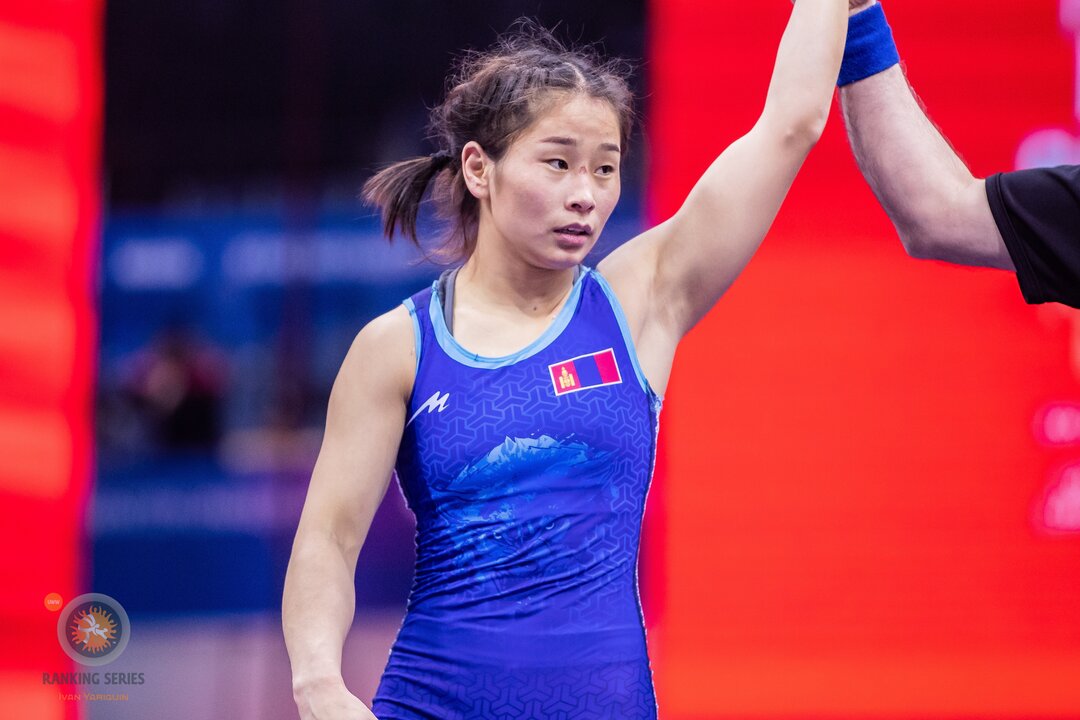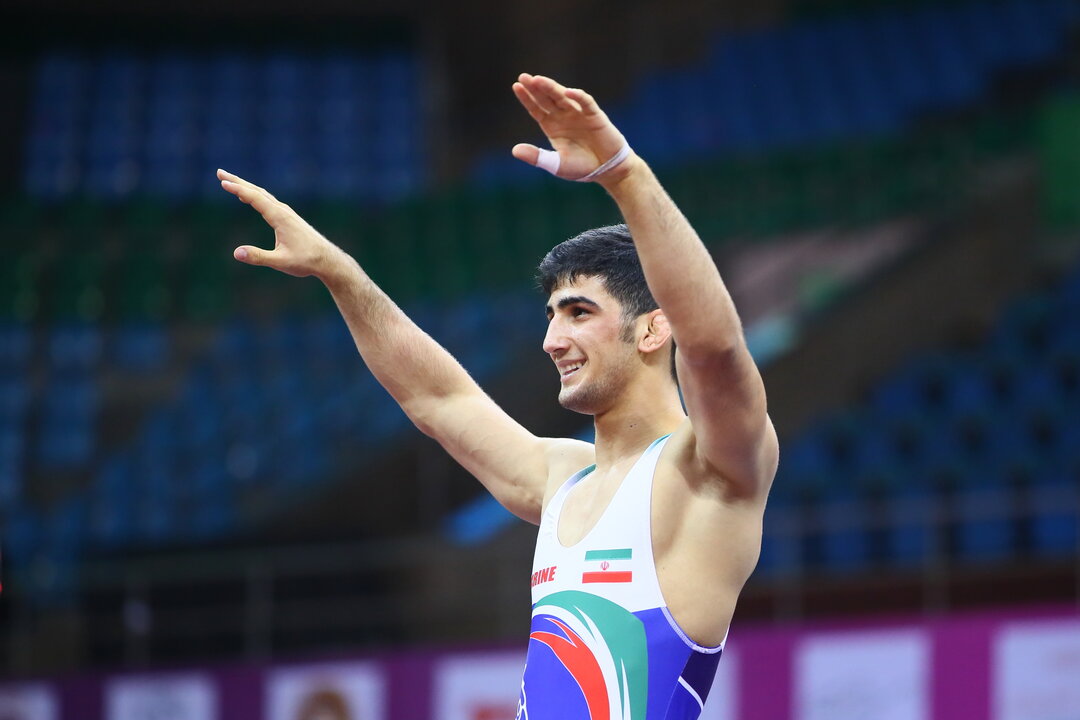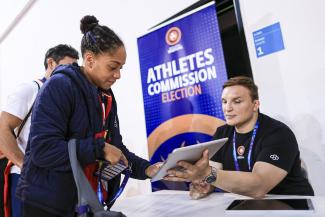Iran and Mongolia Capture Titles at First U23 Asian Championships
Sunday, March 24, 2019 - 17:31 By Ali Feizasa

ULAANBAATAR, Mongolia (March 24) - The host country Mongolia captured the women’s wrestling title at the first edition of the U23 Asian Championships, while Iran's team shined, winning team titles in both freestyle and Greco-Roman.
On the final day of wrestling in Ulaanbaatar, Iran took home three golds and a silver in four freestyle weight categories and captured the team title with 200 points (4 gold, 3 silver, 2 bronze). Mongolia was the runner-up with 177 points (3 gold, 1 silver, 4 bronze) and Kazakhstan finished in third place with 146 points (1 gold, 1 silver, 3 bronze).
Abbas FOROUTAN, the 2018 junior world champion, and two-time junior world medal winner Ahmad BAZRI were the Iranian stars who won the 97kg and 86kg gold medals respectively. Bazri and Foroutan won three of their four matches by technical superiority.
But the most exciting match of the tournament came in the 70kg finals bout where ENKHTUYA Temuulen (MGL) defeated Farhad NOURI (IRI), 11-11 on criteria to make the host fans happy in the closing match of the tournament.
 TSOGT OCHIR Namuuntsetseg (MGL) helped the host nation win the team title with her 50kg gold-medal performance. (Photo: Sachiko Hotaka)
TSOGT OCHIR Namuuntsetseg (MGL) helped the host nation win the team title with her 50kg gold-medal performance. (Photo: Sachiko Hotaka)
In women’s wrestling, the host country Mongolia won four gold medals. India also won four gold medals, while the other two titles went to Kazakhstan and Chinese Taipei.
Mongolia, who won medals in all ten weight categories, earned the women’s wrestling team title with 200 points (4 gold, 2 silver, 4 bronze), followed by India 190 points (4 gold, 3 silver, 2 bronze) and Kazakhstan 162 points (1 gold, 4 silver, 3 bronze).
TSOGT OCHIR Namuuntsetseg (MGL) won a gold medal at 50kg as she downed all three rivals by technical superiority.
 Reigning junior world champion Amin KAVIYANINEJAD (IRI) won the 72kg title outscoring his opponents 35-1. (Photo: Max Rose-Fyne)
Reigning junior world champion Amin KAVIYANINEJAD (IRI) won the 72kg title outscoring his opponents 35-1. (Photo: Max Rose-Fyne)
In Greco-Roman, Iran and Kyrgyzstan had a close battle for the team title. Both countries had four golds and two bronze medal winners, but Iran grabbed one more silver medal and captured the title with 202 points (4 gold, 3 silver, 2 bronze). Kyrgyzstan placed second with 182 points (4 gold, 2 silver, 2 bronze), and Kazakhstan came third with 167 points (2 gold, 2 silver, 3 bronze).
The stars of the Greco-Roman competitions were Iranian Amin KAVIYANINEJAD and Roman KIM from Kyrgyzstan.
Kavianinejad, the 2018 junior world champion, stormed into 72kg gold medal by defeating all four his opponents by technical superiority, outscoring them 35 to 1.
Meanwhile, heavyweight wrestler Roman Kim wrapped up two bouts against Iran and India by fall. He also finished his matches against Mongolia and Kazakhstan via technical superiority and captured 130kg gold medal.
RESULTS
Greco-Roman
(The competition of all weight categories of Greco-Roman was held in Nordic System and all wrestlers in each weight competed with each other in one group.)
Team Standings:
1- Iran 202 pts (4 gold, 3 silver, 2 bronze)
2- Kyrgyzstan 182 pts (4 gold, 2 silver, 2 bronze)
3- Kazakhstan 167 pts (2 gold, 2 silver, 3 bronze)
4- India 128 pts (1 silver, 2 bronze)
5- Mongolia 120 pts (1 silver, 1 bronze)
6- Tajikistan 20 pts (1 silver)
55kg
GOLD - Sardarbek KONUSHBAEV (KGZ)
SILVER - Poya DAD MARZ (IRI)
BRONZE - MUNKH ERDENE Davaabandi (MGL)
60kg
GOLD - Zholaman SHARSHENBEKOV (KGZ)
SILVER - Dastan ZARLYKHANOV (KAZ)
BRONZE - Mehdi MOHSEN NEJAD (IRI)
63kg
GOLD- Meysam DALKHANI (IRI)
SILVER- Elmar TALANBEK UULU (KGZ)
BRONZE- Vijay VIJAY (IND)
67kg
GOLD- Nurbek KYZYROV (KAZ)
SILVER- Khanburged GANKHUYAG (MGL)
BRONZE- Amantur ISMAILOV (KGZ)
72kg
GOLD- Amin KAVIYANINEJAD (IRI)
SILVER- Daler REZAZADE (TJK)
BRONZE- Bek KONURBAEV (KGZ)
77kg
GOLD- Renat ILIAZ UULU (KGZ)
SILVER- Mohammadreza GERAEI (IRI)
BRONZE- Kaharman KISSYMETOV (KAZ)
82kg
GOLD- Mahdi EBRAHIMI (IRI)
SILVER- Kuanyshbek DOSZHANOV (KAZ)
BRONZE- Sanjeet SANJEET (IND)
87kg
GOLD- Mohammad Hadi SARVI (IRI)
SILVER- Kalidin ASYKEEV (KGZ)
BRONZE- Meirbek KORDABAY (KAZ)
97kg
GOLD- Olzhas SYRLYBAY (KAZ)
SILVER- Ravi RAVI (IND)
BRONZE- Hassan ARYANEZHAD (IRI)
130kg
GOLD- Roman KIM (KGZ)
SILVER- Aliakbar YOUSOFI (IRI)
BRONZE- Sarkis PSHENICHNIKOV (KAZ)
Freestyle Results
Team Standings:
1- Iran 200 pts (4 gold, 3 silver, 2 bronze)
2- Mongolia 177 pts (3 gold, 1 silver, 4 bronze)
3- Kazakhstan 146 pts (1 gold, 1 silver, 3 bronze)
4- India 140 pts (1 gold, 2 silver, 1 bronze)
5- Kyrgyzstan 114 pts (1 gold, 1 silver, 1 bronze)
6- Turkmenistan 75 pts (2 silver)
7- China 29 pts
8- Singapore 10 pts
9- Yemen 8 pts
57kg (The competition of this weight was held in Nordic System in one group)
GOLD- Rahul RAHUL (IND)
SILVER- Bekbolot MYRZANAZAR UULU (KGZ)
BRONZE- Chinzorig TSERMAA (MGL)
61kg (The competition of this weight was held in Nordic System in two groups)
GOLD- Ulukbek ZHOLDOSHBEKOV (KGZ) df. Sonba Tanaji GONGANE (IND, 13 – 2
BRONZE- Mohammad NAMJOU MOTLAGH (IRI) df. Assyl AITAKYN (KAZ), 3 - 0
65kg
GOLD- Tulga TUMUR OCHIR (MGL) df. Amirmohammad YAZDANICHERATI (IRI) by FALL
BRONZE- Parveen PARVEEN (IND) df. Weilesu WEILESU (CHN), 6 – 3
BRONZE- Ilyas ZHUMAY (KAZ) df. Zi Xyan LIM (SGP), 10 – 0
70kg (The competition of this weight was held in Nordic System in two groups)
GOLD- Temuulen ENKHTUYA (MGL) df. Farhad Jafar NOURI KHORJESTAN (IRI), 11 - 11
BRONZE- Aidyn TAZHIGALI (KAZ) df. Islambek OROZBEKOV (KGZ), 12 – 2
74kg (The competition of this weight was held in Nordic System in two groups)
GOLD- Otgonbayar BATSUURI (MGL) df. Navid Morad ZANGANEH (IRI) by FALL
BRONZE- Darkhan YESSENGALI (KAZ) df. Bekzhan DZHAMBULOV (KGZ), 5 – 2
79kg (The competition of this weight was held in Nordic System in one group)
GOLD- Ali SAVADKOUHI (IRI)
SILVER- Veer Dev GULIA (IND)
BRONZE- Atai IZABEKOV (KGZ)
86kg (The competition of this weight was held in Nordic System in one group)
GOLD- Ahmad BAZRI (IRI)
SILVER- Dovletmyrat ORAZGYLYJOV (TKM)
BRONZE- Gankhuyag GANBAATAR (MGL)
92kg (The competition of this weight was held in Nordic System in one group)
GOLD- Arashk MOHEBI (IRI)
SILVER- Azat GAJYYEV (TKM)
BRONZE- Tsogtgerel MUNKHBAATAR (MGL)
97kg (The competition of this weight was held in Nordic System in one group)
GOLD- Abbas FOROUTAN (IRI)
SILVER- Zhassulan YERMENBET (KAZ)
BRONZE- Mungunshagai TUMURBAT (MGL)
125kg (The competition of this weight was held in Nordic System in two groups)
GOLD- Yusup BATIRMURZAEV (KAZ) df. Lkhagvagerel MUNKHTUR (MGL) by FALL
BRONZE- Mohammad MORADI (IRI) df. Muzafar ZHAPPUEV (KGZ), 11 – 9
Women’s Wrestling Results
Team Standings:
1- Mongolia 200 pts (4 gold, 2 silver, 4 bronze)
2- India 190 pts (4 gold, 3 silver, 2 bronze)
3- Kazakhstan 162 pts (1 gold, 4 silver, 3 bronze)
4- Chinese Taipei 37 pts (1 gold)
5- Kyrgyzstan 32 pts (1 silver)
50kg
GOLD- Namuuntsetseg TSOGT OCHIR (MGL)
SILVER- Svetlana ANKICHEVA (KAZ)
BRONZE-Jyoti JYOTI (IND)
53kg
GOLD- Khaliunaa BAYARAA (MGL)
SILVER- Reena REENA (IND)
BRONZE- Ellada MAKHYADDINOVA (KAZ)
55kg
GOLD- Marina SEDNEVA (KAZ)
SILVER- Anju ANJU (IND)
BRONZE- Bolortuya BAT OCHIR (MGL)
57kg
GOLD- Khongorzul BOLDSAIKHAN (MGL)
SILVER-Nuraida ANARKULOVA (KGZ)
BRONZE- Yekaterina FIRSTOVA (KAZ)
59kg
GOLD- Kumari MANJU (IND)
SILVER-Madina BAKBERGENOVA (KAZ)
BRONZE- Otgonbayar PUREV (MGL)
62kg
GOLD- Purevsuren ULZIISAIKHAN (MGL)
SILVER- Irina KUZNETSOVA (KAZ)
BRONZE- Radhika RADHIKA (IND)
65kg
GOLD- Tina TINA (IND)
SILVER- Bolortuya KHURELKHUU (MGL)
Tina TINA (IND) df. Bolortuya KHURELKHUU (MGL), 13 – 2
68kg
GOLD- Divya KAKRAN (IND)
SILVER-Delgermaa ENKHSAIKHAN (MGL)
BRONZE- Valeriya GONCHAROVA (KAZ)
72kg
GOLD- Naina NAINA (IND)
SILVER- Alexandra ZAITSEVA (KAZ)
BRONZE- Tsogzolmaa DORJSUREN (MGL)
76kg
GOLD- Hui Tsz CHANG (TPE)
SILVER- Pooja POOJA (IND)
BRONZE- Zagardulam NAIGALSUREN (MGL)


Share your thoughts.
Comments